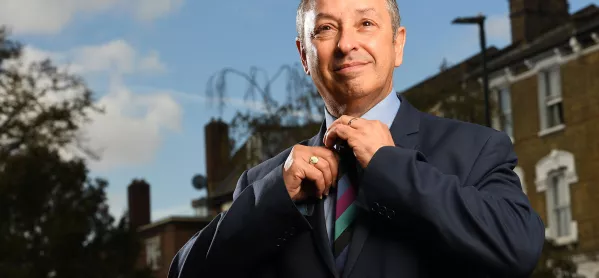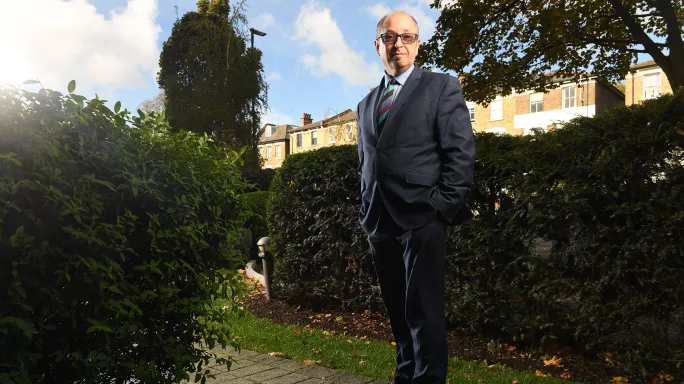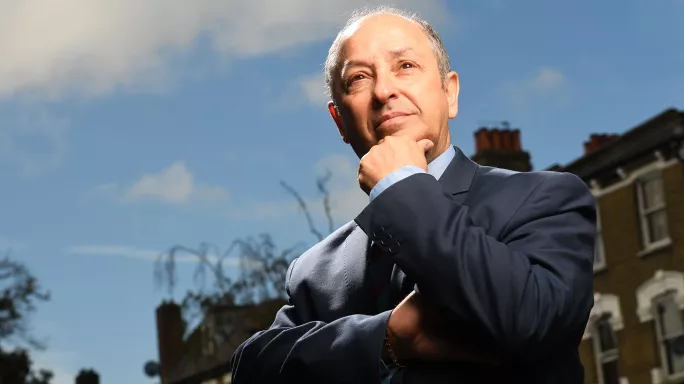- Home
- Meet the man who wants to save teachers from themselves
Meet the man who wants to save teachers from themselves

In his early working life, as a professional actor, he used to get killed off in scene two of “anything he was in”. That’s the joke anyway.
His biggest-ever part - as the son in the first-ever Jewish family in the soap opera Brookside - never even materialised because the storyline was axed.
With hindsight it didn’t matter - because three decades later Julian Stanley is now arguably in a far more important and worthwhile job - as chief executive of a national charity dedicated to improving the mental health of the nation’s teachers and other education staff.
The Education Support Partnership took more than 8,600 calls to its helpline last year, from NQTs to headteachers, and that number is up 35 per cent from the previous year.
Stanley has taught himself, in a theatre education programme touring schools, so he knows the challenges and the culture in our education system, and he’s seen the stress on the frontline.
Changing the world
He says he was always torn between teaching and acting, and while he trained in the latter, he then went on to work in hundreds of schools across the country.
“People used to ask me back into their schools to teach and I got the opportunity to train professionally but I decided not to because I wasn’t sure I wanted to do it. I loved being in the classroom, and I could hold the room, but I remember thinking that it’s one thing doing it part-time and another doing it day-in and day-out.”
He now “in some ways” regrets not qualifying as a teacher, and says he may well have gone into headship “because the difference you can make is huge”.
But there are different ways to change the world.
Latest figures from the charity show a “sharp rise” in the number of headteachers and senior leaders calling for help, including those suffering depression and those turning to alcohol to help them cope.
“The pressure is partly to do with money and resources, and partly to do with the inability to recruit and retain,” says Stanley, who is due to be on TV this weekend, publicising the bleak findings in his charity’s latest report into teacher mental health.
He’s no stranger to being on screen, of course. He’s a strong and clear talker. He’s animated, smiling and articulate, and is able to make his points convincingly.

“One of the things about teachers is that they are very driven by the morals and ethics of wanting to get things right, and sometimes they struggle around the workload because they struggle with the boundary issues of saying no. And sometimes asking for help can be difficult because you can be shown to be vulnerable, especially in a school if the culture isn’t right.”
Reasons teachers call the helpline can range from pupil behaviour to problems with colleagues or mentors to insomnia caused by workload.
“We get calls from people saying they’re feeling physically sick, or as if they’re on the verge of having some really serious mental health problem like a breakdown” he says.
The value of counselling
Stanley knows first-hand the value of counselling after undergoing months of weekly counselling sessions himself, aged 33, shortly after the birth of his first child. It stemmed from the fact that his own father had been “emotionally absent” and that he felt he didn’t have a “road map” for parenting.
“I came from a working class family where if you ever had a problem you just got on with it, and you picked yourself up and dusted yourself off, and you didn’t really talk about what anything meant.
“What was great [about the counselling] was that it taught me about the power that having a conversation with somebody can have.
“For a lot of people it’s about wanting to be heard and listened to, and being able to regain a sense of agency in either their personal or professional life.”
He’s concerned that not enough men are calling for help.
“What we’re saying is that you don’t have to be on the verge of a breakdown to ask for help. The message I’m giving is that most people at some point in their lives will need help or support.”
Stanley is self-deprecating about the highlights of his acting career, noting that he once had a walk-on part in Coronation Street. His biggest role was as French author Andre Gide in the 1988 film Testimony, starring Ben Kingsley, about the life of Russian composer Shostakovich. In the film A Flame to the Phoenix (1983) he was told he had to cut his long hair, only to be killed off, as was to become typical, in the second scene.
But you get the feeling he won’t be killed off in his current role. He’s been boss of the Education Support Partnership for nine years and is keen for it to grow. The charity is funded by donations from teachers and retired teachers, some of whom have received help from it.

‘Let’s not have any more change - let’s value teachers instead’
The father-of-three was born in Bury and went to school in Manchester.
You can still hear a slight Manchester accent in his voice as he talks passionately about changing things, and how trainee teachers need training on looking after their mental health and wellbeing. Stanley is pleased that some schools already have wellbeing coordinators for staff, and points to the benefits of teachers being actively encouraged to pursue their own interests as a means of boosting good mental health.
His charity is trying to address the roots of teacher wellbeing by changing the culture in schools. “We spend a lot of time working with leaders and middle managers on how to create a collegiate atmosphere where vulnerability is allowed to show itself,” he says.
“Because that’s where people see people as human beings. One of the things I raise with ministers at policy level is that while data systems and technical work is really important, it’s how people engage with one another in the people that is actually critical; and that’s what I mean by soft skills - actually communicating with one another, working with colleagues, prioritising what is really important here, and that helps teachers feel that they can be more vulnerable.
“I long for a period where there’s consensus around not creating anymore change. A lot of the reforms that Gove put in have bedded down to some degree now, whether you like them or not - the structural changes have taken place - and what the profession doesn’t need now is such a massive rapid pace of change again with curriculum change and so on. It needs a period where actually you can focus on retention and recruitment and on making the people in the profession feel valued and skilled. A five-year period would be fantastic!”
‘Profound effect’ of seeing inside people
Stanley is also a trained coach who “facilitates” and “empowers” headteachers and teachers to find answers and solutions for themselves.
He says: “I was at a coaching day with head teachers in Kent recently, and it was about health and wellbeing, and all they talked about in the morning was their staff, and what they were concerned about, and how they could help them. But after lunch people started to talk more about themselves, like ‘my wife thinks I’m drinking too much’ or ‘I smoke a lot more now or’ and someone said ‘I actually had a tearful moment the other day when I wasn’t sure how to deal with a situation.’
“Once people started to reveal more, it was clear they weren’t ineffective heads, but that it was just that they were able to share a bit of that humanity that allows people to see inside you a bit more, and I think that can have a profound effect.
“With NQTs you get different problems like ‘I’m not sure if my mentor is the right mentor for me’ or ‘I love teaching but I’m not sure I’ll be able to cope with the pressure of it long term’ or ‘I feel I’ve made a mistake by getting into the profession so what can I do?’ And sometimes by exploring it with a counsellor on the phone they can be coached through what problems they’re having and actually what they do is they regroup and they have a chance to think and reflect.”
Stanley’s ambition for the charity is that it will be known far and wide by every teacher in every school as a resource where individuals or organisations can seek help to improve mental health and wellbeing.
“Teachers are being asked, aren’t they, to look at the mental health of children, and my argument has always been that that is going to be pretty tricky if teachers don’t understand that for themselves and what it means for them.”
The Education Support Partnership helpline number is 0800 0562501.
CV - Julian Stanley
2009 - Present: Chief Executive - Education Support Partnership
2001-2008 Chief Executive, MD & Company Secretary - The Cresset (Peterborough) Ltd
2000 - 2001 Chief Executive - Capital Link London - Urban Regeneration Partnership
1997- 2000 Acting Director - Interchange Trust London Arts Educational Charity and Resource Centre
1995-1997 Director - Selby Centre Educational Trust - Multi-Cultural arts, sports, community education & training centre.
1991-1995 Arts, Events & Cultural Services Manager - Newham Council Leisure Services
Early career
Part-time Drama, English and RE teacher for eight years
Professional Actor and Singer: Theatre in Education, touring schools across the UK, BBC radio Rep, TV & Film. National Theatre, Touring and Repertory
Civil Servant - Employment Services Agency
Trustee roles
• Trustee and Company Secretary - Association of Charity Organisations (2010-2016)
• Chair, Cambridge and Peterborough Learning Trust (2006-2010)
• Founder Director and Company Secretary of Stratford Circus Arts Education Centre (1997 - 2002) - £12m Arts Council Lottery funded project with Newham Council, Stratford Development Partnership & the Theatre Royal Stratford East
Education and training
• University of Cambridge - Judge Business School
• University of North London
• Manchester Metropolitan University
• The Leadership Trust
• Meyler Campbell - Executive Business Coaching
Keep reading for just £1 per month
You've reached your limit of free articles this month. Subscribe for £1 per month for three months and get:
- Unlimited access to all Tes magazine content
- Exclusive subscriber-only stories
- Award-winning email newsletters



